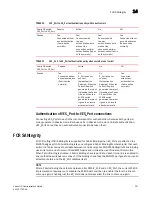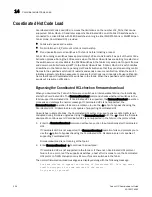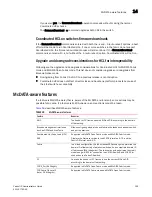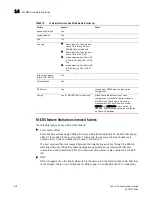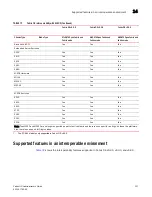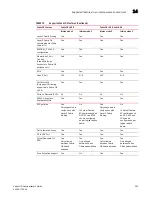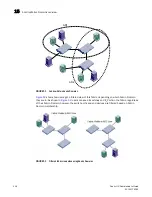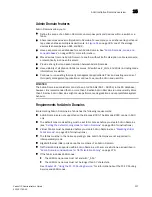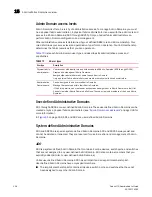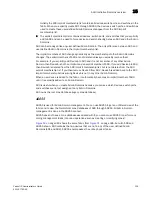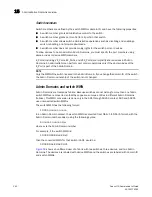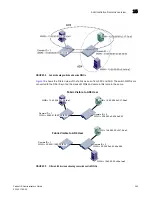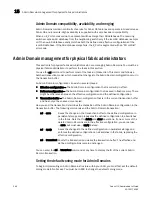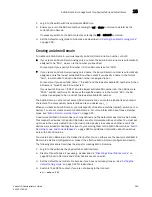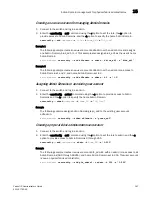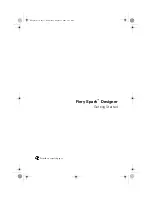
Fabric OS Administrator’s Guide
335
53-1001763-02
Chapter
15
Managing Administrative Domains
In this chapter
•
Administrative Domains overview . . . . . . . . . . . . . . . . . . . . . . . . . . . . . . . . 335
•
Admin Domain management for physical fabric administrators . . . . . . . . 344
•
SAN management with Admin Domains . . . . . . . . . . . . . . . . . . . . . . . . . . . 356
Administrative Domains overview
An
Administrative Domain
(Admin Domain or AD) is a logical grouping of fabric elements that
defines which switches, ports, and devices you can view and modify. An Admin Domain is a filtered
administrative view of the fabric.
NOTE
If you do not implement Admin Domains, the feature has no impact on users and you can ignore this
chapter.
Admin Domains permit access to a configured set of users. Using Admin Domains, you can
partition the fabric into logical groups and allocate administration of these groups to different user
accounts. These accounts manage only the Admin Domains assigned to them and do not make
changes to the rest of the fabric.
For example, you can put all the devices in a particular department in the same Admin Domain for
ease of managing those devices. If you have remote sites, you could put the resources in the
remote site in an Admin Domain and assign the remote site administrator to manage those
resources.
Admin Domains and Virtual Fabrics are mutually exclusive and are not supported at the same time
on a switch.
Do not confuse Admin Domains with zones:
•
Zones define which devices and hosts can communicate with each other.
•
Admin Domains define which users can manage which devices, hosts, and switches.
You can have up to 256 Admin Domains in a fabric (254 user-defined and 2 system-defined),
numbered from 0 through 255. Admin Domains are designated by a name and a number. This
document refers to specific Admin Domains using the format “AD
n
” where
n
is a number between
0 and 255.
NOTE
Do not confuse an
Admin Domain number
with the
domain ID of a switch
. They are two different
identifiers. The Admin Domain number identifies the Admin Domain and has a range of 0–255. The
domain ID identifies a switch in the fabric and has a range of 1–239.
Figure 51
on page 336 shows a fabric with two Admin Domains: AD1 and AD2.
Summary of Contents for 53-1001763-02
Page 1: ...53 1001763 02 13 September 2010 Fabric OS Administrator s Guide Supporting Fabric OS v6 4 0 ...
Page 4: ...iv Fabric OS Administrator s Guide 53 1001763 02 ...
Page 24: ...xxiv Fabric OS Administrator s Guide 53 1001763 02 ...
Page 28: ...xxviii Fabric OS Administrator s Guide 53 1001763 02 ...
Page 32: ...xxxii Fabric OS Administrator s Guide 53 1001763 02 ...
Page 40: ...xl Fabric OS Administrator s Guide 53 1001763 02 ...
Page 42: ...2 Fabric OS Administrator s Guide 53 1001763 02 ...
Page 54: ...14 Fabric OS Administrator s Guide 53 1001763 02 High availability of daemon processes 1 ...
Page 74: ...34 Fabric OS Administrator s Guide 53 1001763 02 Basic connections 2 ...
Page 102: ...62 Fabric OS Administrator s Guide 53 1001763 02 Audit log configuration 3 ...
Page 214: ...174 Fabric OS Administrator s Guide 53 1001763 02 Management interface security 7 ...
Page 228: ...188 Fabric OS Administrator s Guide 53 1001763 02 Brocade configuration form 8 ...
Page 276: ...236 Fabric OS Administrator s Guide 53 1001763 02 Creating a logical fabric using XISLs 10 ...
Page 404: ...364 Fabric OS Administrator s Guide 53 1001763 02 ...
Page 440: ...400 Fabric OS Administrator s Guide 53 1001763 02 Performance data collection 17 ...
Page 480: ...440 Fabric OS Administrator s Guide 53 1001763 02 F_Port masterless trunking 19 ...
Page 494: ...454 Fabric OS Administrator s Guide 53 1001763 02 Buffer credit recovery 20 ...
Page 574: ...534 Fabric OS Administrator s Guide 53 1001763 02 Hexadecimal overview E ...

